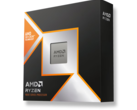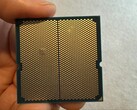The AMD Ryzen 9000X3D CPUs seem to be about ready to launch, with the latest leaks and rumours all but confirming an October announcement for the Ryzen 7 9800X3D and the Ryzen 9 9950X3D. According to a new set of leaks from @CodeCommando_ on X, the new X3D CPUs will provide a rather impressive performance boost over their Ryzen 7000 counterparts.
Ryzen 9 9950X3D vs Ryzen 9 7950X3D
- Ryzen 9 9950X3D Cinebench R23 multi-core: 42375 points
- Ryzen 9 9950X3D Cinebench R23 single-core: 2245 points
- Ryzen 9 7950X3D Cinebench R23 multi-core: 35794 points
- Ryzen 9 7950X3D Cinebench R23 single-core: 2009 points
If those multi-core Cinebench R23 results are accurate, this would make the Ryzen 9 9950X3D 18.4% faster than the Ryzen 9 7950X3D (curr. $618 on Amazon), which scored an average of 35794 points in our performance testing. It's important to note, however, that Cinebench R23 is a somewhat outdated benchmark, with Cinebench 2024 replacing it due to improved accuracy and higher CPU loads — making it a more suitable test for powerful modern CPUs. This performance boost is roughly in line with what we have come to expect from the Ryzen 9000 CPUs.
The eight-core Ryzen 7 9800X3D, usually the more relevant SKU for gamers, however, is where things get interesting, with both single-core and multi-core performance numbers seeing a significant boost over the Ryzen 7 7800X3D.
Ryzen 7 9800X3D vs Ryzen 7 7800X3D
- Ryzen 7 9800X3D Cinebench R23 multi-core: 23315 points
- Ryzen 7 9800X3D Cinebench R23 single-core: 2145 points
- Ryzen 7 7800X3D Cinebench R23 multi-core: 17197 points
- Ryzen 7 7800X3D Cinebench R23 single-core: 1726 points
Comparing to the Ryzen 7 7800X3D results from our in-depth performance testing, the Ryzen 7 9800X3D looks to have around a 35.6% performance lead over its predecessor in multi-core tests. The single-core benchmark result is equally impressive, with the Ryzen 7 9800X3D clocking a 24.3% improvement over the 7800X3D.
These massive performance improvements are likely due to both efficiency improvements wrought by Ryzen 9000, although there are also rumours of significantly larger V-Cache chips, with one dedicated to each CCD, which should solve some of the scheduling issues that plagued previous X3D CPUs.
























